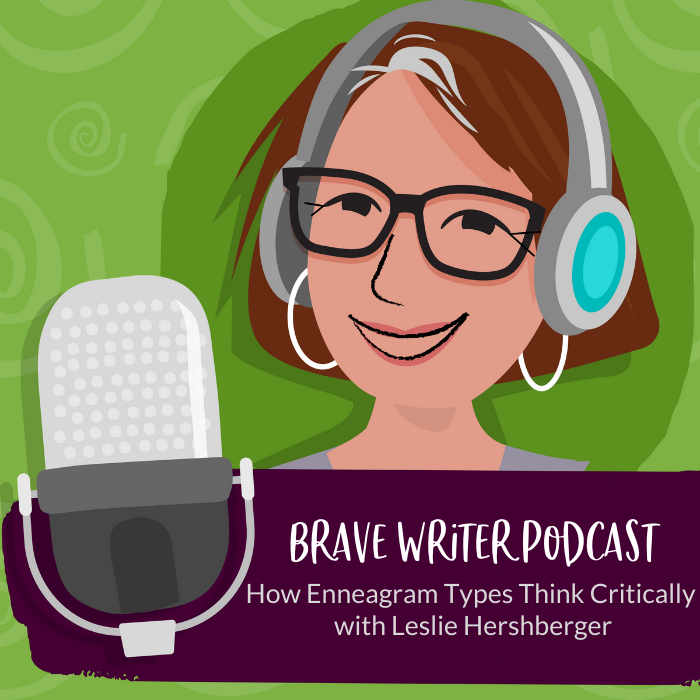Podcast: How Enneagram Types Think Critically with Leslie Hershberger

What a treat I have for you today!
On today’s podcast we’re talking about the enneagram, a tool for self-knowledge. It’s a hot field of interest in the world of personality, temperament, and raising kids. A lot of what I find online, however, focuses more on the idiosyncrasies and caricatures of each type (because, let’s face it, humor!) than parsing the way we can use our self-awareness for depth and growth.
Today, we’re going to deep dive into the way our drives and motivations influence how well we think. In fact, you’ll get a much better idea of how to work with your “different-from-you” kids too!
Leslie Hershberger is one of my dear local friends and also an internationally renowned master teacher of the enneagram. I have participated in her panel work and her conferences. She’s awesome!
Because this area is new to many of you (and because some of you are uber-fans of the enneagram), Leslie is offering us a SWEET deal for her most popular course. Take advantage of it while you can!
And be sure to listen to our podcast episode together (listen below). We had fun!
For the discount code go HERE.
Use coupon code: bravewriter
Get: 25% off
The Enneagram can be a useful tool for understanding the different ways in which people perceive the world, but how can it apply to critical thinking?
Leslie Hershberger has a unique blend of wisdom, practical training, and insight. She has worked with the three-centered Enneagram approach for over 20 years as a consultant, master teacher, coach, spiritual guide, facilitator, and mentor. She’s certified in The Narrative Tradition and in Enneagram in Business and has served on the board of the International Enneagram Association.
On this episode of the Brave Writer podcast, Leslie talks about how critical thinking shows up in each of the nine Enneagram types. Some of this conversation gets into the weeds of the Enneagram system, but if you stick with it you will come away with a greater understanding of the ways people sort the world.
Listen to the Podcast
Show Notes
What is the Enneagram?
Every time we walk into a room, we apply a filter to the information we receive. The Enneagram is an examination of how we use that filter to sort and make us of this knowledge. It comprises nine different patterns of thought, emotion, and behavior. The brain can’t process all of the data available at any given time, so the Enneagram acts as a way to provide some predictability.
Every child has a different temperament from birth. It dictates how they start to look for power, control, connection, affection, security, and a sense of safety. Their natural Enneagram personality type shapes their entire personality.
The Nine Enneagram Types
First are the body types, oriented towards power and control:
- 1: The Perfectionist
- 8: The Protector
- 9: The Mediator
Next is the heart center, oriented towards connection:
- 2: The Giver
- 3: The Performer
- 4: The Romantic
Lastly, the head center is oriented towards security and safety:
- 5: The Observer
- 6: The Loyal Skeptic
- 7: The Epicure
How Critical Thinking Shows Up Through the Three Centers
The Body:
Body types feel things strongly in their anatomy. They are defined by what they do and don’t like. They often hold a defensive position when it comes to power and control. When dealing with children who are body types, don’t push your agenda. And if you are a body type, pay attention to how your automatic and instinctual preferences come up in the present moment — and how you defend against them. Have some kindness for yourself because you’re protecting something that matters for you, and once you’ve acknowledged that, you can start to make room for other viewpoints.
The Head:
Head types can get so wrapped up in their thoughts that they miss what’s happening to others. They get so locked into their thoughts and ideas that they can even dissociate from the information. The first thing head types need to do to open up to other viewpoints is to ground themselves in their bodies. Head types need to get in touch with their feelings, otherwise they can be overwhelmed by trying to find meaning in the world.
The Heart:
Heart types focus on the “doing.” They shapeshift in order to connect with other people. They are primed to be conditioned by their environment, and they often lose their connection with how they feel inside. Understanding their past can allow them to trace their experiences forward, giving better understanding of the present.
The more you learn about your style of thinking — strengths, weaknesses, and blindspots — the more you can adapt and course-correct where necessary. There’s a reason it’s called “critical thinking:” it’s not automatic and it’s going to take work, but if we think actively and consciously call out our biases, we can all become stronger critical thinkers and better people as a result.
Resources
- lesliehershberger.com
- Sign up for The Centers Approach Course and get 25% off using code “bravewriter”
- Read: “The Complete Enneagram” by Beatrice Chestnut
- Peter O’Hanrahan: theenneagramatwork.com
- Purchase our Intuitive Homeschool Planning Tool at store.bravewriter.com
- Want help getting started with Brave Writer? Head over to bravewriter.com/getting-started
- Sign up for the Brave Writer Newsletter to learn about all of the special offers we’re doing in 2020 + you’ll get a free 7-Day Writing Blitz guide just for signing up: http://go.bravewriter.com/writing-blitz
Connect with Julie
- Instagram: instagram.com/juliebravewriter
- Twitter: twitter.com/bravewriter
- Facebook: facebook.com/bravewriter


















